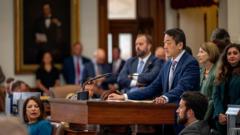WASHINGTON (AP) — Senate Republicans are taking the first steps to change the chamber’s rules on Thursday, making it easier to confirm groups of President Donald Trump’s nominees and overcome Democratic delays.
Senate Majority Leader John Thune’s move is the latest salvo after a dozen years of gradual changes by both parties to weaken the filibuster and make the nominations process more partisan. He has said the Democrats’ obstruction is 'unsustainable,' particularly as they have drawn out the confirmation process, leaving many positions in Trump's administration unfilled.
Thune stated that the delays have prevented the Senate from focusing on legislative business, saying, 'We’re going to fix this today, and restore the longtime Senate precedent of expeditious confirmation, and the Senate’s role as first and foremost a legislative body.'
Republicans are conducting procedural votes on a set of 48 of Trump’s nominees and plan to vote to change the rules, which can be accomplished with a simple majority. If their efforts succeed, the nominees, including undersecretaries and ambassadors, could be confirmed by next week.
Both parties have a history of obstructing nominees from the opposing party, advocating for a quicker process when in the majority. However, this particular rules change does not address high-level Cabinet roles and lifetime judicial appointments and is partly derived from proposals put forth by Democrats during President Joe Biden's tenure.
Republicans have sought these changes since summer when bipartisanship broke down over confirmation processes, and after an outburst by Trump directed at Senate Democratic Leader Chuck Schumer.
Democratic resistance has reached unprecedented levels, with many opposing Trump's nominees and pressing for debates on individual appointments. Schumer has argued that thorough evaluation of nominees is crucial to prevent the appointment of undesirable candidates.
This confrontation echoes a similar warning from Schumer regarding potential long-term consequences of altering Senate procedures, referencing prior incidents where Republicans faced repercussions for changing rules during the Obama administration.
As negotiations continue, the implications of these rule changes remain a focal point of contention between both parties, potentially reshaping the dynamics of Senate confirmations for years to come.





















